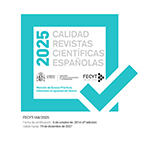Prueba de inmigración y márgenes legales del desencuentro. Políticas públicas, prácticas sociales y construcción de la persona
Resumen
La redacción de las directrices y los procedimientos administrativos que hacen virtualmente posible la inmigración, contribuye a construir no sólo los itinerarios sino también el imaginario social sobre la alteridad. El principal objetivo del artículo es poner de relieve –mediante el análisis discursivo de las Hojas informativas publicadas en la WEB del Ministerio de Empleo y Seguridad Social- cómo la construcción social del emigrante/inmigrante y el proyecto migratorio topan con unas representaciones y envites, instituidos y refrendados en y por la propia formulación de la reglamentación, pero no del todo explícitos. Entendiendo el texto como una acción que genera otras acciones, se examinan las consecuencias que tiene sobre la practica social de los inmigrantes. En suma, se trata de vislumbrar los elementos (terminología, fórmulas, esquemas y prácticas inducidas) que van constituyendo al inmigrante como agente social subordinado a micro-procesos y relaciones que se le escapan en gran parte (en contra de las apariencias que parecieran sugerir lo contrario) y van marcando su propia capacidad de acción. En conclusión y retomando la distinción entre principio de diferencia y principio de indiferencia sugerida por Foucault, se muestra que mientras el primero rige las clausulas generales, el segundo articula las específicas.
Descargas
Descarga artículo
Licencia
La revista Política y Sociedad, para fomentar el intercambio global del conocimiento, facilita el acceso sin restricciones a sus contenidos desde el momento de su publicación en la presente edición electrónica, y por eso es una revista de acceso abierto. Los originales publicados en esta revista son propiedad de la Universidad Complutense de Madrid y es obligatorio citar su procedencia en cualquier reproducción total o parcial. Todos los contenidos se distribuyen bajo una licencia de uso y distribución Creative Commons Reconocimiento 4.0 (CC BY 4.0). Esta circunstancia ha de hacerse constar expresamente de esta forma cuando sea necesario. Puede consultar la versión informativa y el texto legal de la licencia.











